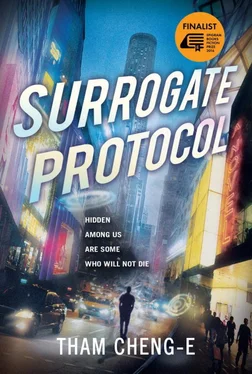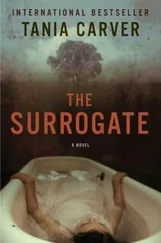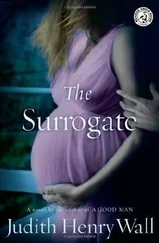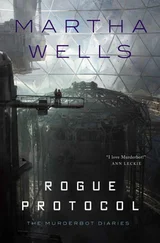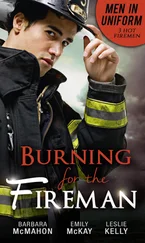“Oh yes,” Ginn digs into her bag and retrieves a pair of jangling dogtags and a small silver cross threaded in a black string, and presses them into his hand in a way that he could not refuse. “John wants you to have this. It’s in his will to give it to his last living client.”
Aldred’s lip trembles. “But I can’t… he ought to be giving y—”
Ginn lays her hand over Aldred’s. “He’s left us with enough.”
Aldred is staring so hard at the gift that he fails to notice how Fanny has been observing him over the top edge of her novel.
“What are you going to do about the Serum?” he asks.
“Remove it when it’s time, once Fanny’s healed,” says Ginn. “I believe mortality was put in place for a purpose. I don’t intend to go against that.”
Aldred nods and closes his fingers over John’s gift.
Ginn checks her watch. “We must go. Fanny’s due for her checkup.” She takes the receipt with the intention of paying for the drinks but Aldred stops her.
“I’m buying.”
He accompanies them to the car and stows the stroller at the back while Ginn straps Fanny into the rear seat. They shake hands and Aldred lingers by the window. “I wish there was something more I could do,” says he.
“Remember John for who he was.” Ginn squints to a dusty gust of wind. Then turning over her shoulder she addresses Fanny, “Say bye-bye to Uncle Landon.”
Fanny waves and smiles, and in it Aldred sees gratitude. The car leaves the lot and Aldred watches it until it cruises down the narrow street and out of sight. He fingers the gift in his hand and in a moment’s thought, slings it over his head.
He returns to the café and clears Ginn’s table. When he dumps the tray of empty glasses on the countertop a colleague—a skinny young lady with a purple fringe—tosses him a napkin as she passes. “Must’ve made an impression.”
At first Aldred thinks little of it. But when he takes the napkin a flash of déjà vu leaps at him. His heart flutters. He parts the folded napkin and finds two lines of classic slanted script written in a neat hand:
To your Barista,
If I get a second shot at life, I’d like to bake a sugar cake with you.
Aldred crashes through a door and almost smashes it against the adjacent wall.
Hannah.
He can’t explain otherwise. It had to be John’s weapon; she must have made the switch. There could be no other plausible explanation.
In fact there mustn’t be.
He runs back to the street and finds it empty as ever. He inspects every parked car and races down a good length of the sidewalk until his chest burns and his veins pump acid. He strains his neck and looks wildly about, knowing it isn’t going to do any good.
Absently, he slips his hand into his pocket and retrieves a card that reads Odds & Ends Antiques & Collectables .
John had been right about the Transfusion.
He could make the call, take her to see Thaddeus, get her fixed. And one day, they might find themselves a cosy little home. They would hear children bickering over the sugar cake. And as the children nap they would have tea—tea for two.
And they would be happy.
And yes, he remembers the code.
Iftahya Simsim.
QARA BUDANG TABUNAI was a compact, desiccated little man of exceptional strength. But to his memory the last gainful employment of it was at the battle of Taka Island—five centuries earlier. He was built like a rock, with short, thick arms and large, powerful hands. His name meant Great Bear, and his hairless pate, darkened by decades of sun, sparkled with beads of sweat. He wasn’t used to the tropics, and the bustle of merchant activity at the mouth of the river imbued confusion that drove at his temper.
It told him how much he had come to loathe the city.
From a crouching, skeletal hawker he bought himself and his wife a mango each. The hawker skinned it for them, and its honeyed sweetness refreshed them. Through a brief, halting conversation with the hawker he learnt that the vast agglomeration of skiffs by the river banks were called sampans in the native tongue, and that they were trading textiles and lucrative spices like nutmeg and turmeric, and that the grey-bricked ramparts with the thirty-two pounders were a part of a fort they named Fullerton.
It had been built over the Stone that marked the chamber.
And it was where Origen had gone in the past hour.
At last, in the distant street, by a seawall of sandstone and lime mortar, a tall figure emerged, clothed in the hooded robe of a monastic monk. It was Origen, trudging unhurriedly amongst the natives, a wide-rimmed hat shadowing his fair and pearly face, and still it gleamed white against the potpourri of dusky races around him.
“The chamber remains, Great Bear.” Origen arrived and gave him a slight, rigid bow. “But the Key has been taken.”
“So the governor knows,” said Great Bear.
“Only what has been revealed,” said Origen. “They would not be expecting a second Key.” He hands him a scroll sealed in an official’s signet. “Mister Wren had procured the plot on high ground. Its ascent is shallow, yet the natives call it Mount Harriet.”
“Then it is a prominent peak.”
“A humble plot nonetheless, but I trust it is adequate.”
“I care little for size, Origen. It has to be fertile.”
“I understand.”
They moved, weaving amongst labourers, streetwalkers and rickshaws as a single, conspicuous troupe. Origen in a robe, Great Bear still in the old haori he wore onto the ship that bore them to this strange island. Beside them his wife draped a fraying shawl over her cotton kimono. Great Bear wasn’t Japanese, but on this island few would be discerning.
Battery Road took them away from the fort and led them north. Along the way they passed ageing go-downs roofed in terracotta and squat merchant houses of crumbly plaster. By the five-foot ways, and away from streams of traversing coolies, youths panhandled, some tapping their tin cans on the ground and others lazing in a half-stupor, waiting for the day’s end. Great Bear knew of wretches like them—found in almost every inhabited land, bereft of identities yet belonging closely to the one of their collective. In his lifetimes he had seen too many. But one drew his sympathy.
A child with a small, dirt-smeared face. Beneath the filth Great Bear saw a peculiar ethnicity he couldn’t place. He watched the large, sienna pupils and they watched him back. Inwardly he mourned over the thin, gnarled limbs, a head that appeared much too heavy for its veiny, fragile neck. The child didn’t rap his can like the others, but sat slumped against a pillar, weakened, spent, and inured of suffering. He was little: five years old at most, Great Bear reckoned, far too young to even forage or swindle like the older ones.
Great Bear went over, exuding such mysterious authority that the other panhandlers parted and gave him passage. He picked up the child and found him limp as a corpse. The child did not resist but put his head on Great Bear’s thick shoulder, and there it remained.
The wife stroked the child’s hair. “As a surrogate?” she asked in Japanese.
“As a son,” said Great Bear.
“But the Serum—”
“In time, Origen will liberate me from it.” Great Bear patted the child, his large hand stretching over the child’s back. “The depraved man is never meant to live that long.”
“You will die.”
“And so we shall, together, when you are well in years.” Great Bear turned smilingly to her. “Yet our child will grow. And by the Lord’s grace he will heal and save.”
An ugly voice sullied their conversation. A merchant, dressed in silk and holding a fan, came strutting from the unlit bowels of a granary that stocked barley and rice. With unabashed honesty he declared ownership over the panhandlers, including the enfeebled child on Great Bear’s shoulders.
Читать дальше
